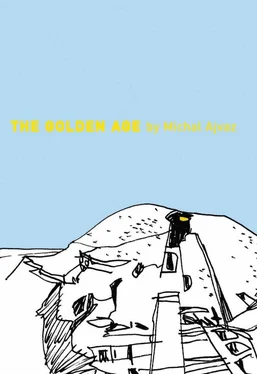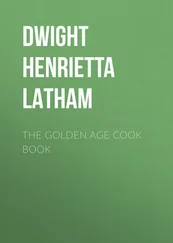Michal Ajvaz - The Golden Age
Здесь есть возможность читать онлайн «Michal Ajvaz - The Golden Age» весь текст электронной книги совершенно бесплатно (целиком полную версию без сокращений). В некоторых случаях можно слушать аудио, скачать через торрент в формате fb2 и присутствует краткое содержание. Год выпуска: 2010, Издательство: Dalkey Archive Press, Жанр: Современная проза, на английском языке. Описание произведения, (предисловие) а так же отзывы посетителей доступны на портале библиотеки ЛибКат.
- Название:The Golden Age
- Автор:
- Издательство:Dalkey Archive Press
- Жанр:
- Год:2010
- ISBN:нет данных
- Рейтинг книги:4 / 5. Голосов: 1
-
Избранное:Добавить в избранное
- Отзывы:
-
Ваша оценка:
- 80
- 1
- 2
- 3
- 4
- 5
The Golden Age: краткое содержание, описание и аннотация
Предлагаем к чтению аннотацию, описание, краткое содержание или предисловие (зависит от того, что написал сам автор книги «The Golden Age»). Если вы не нашли необходимую информацию о книге — напишите в комментариях, мы постараемся отыскать её.
is Michal Ajvaz’s greatest and most ambitious work.
The Golden Age
The Golden Age — читать онлайн бесплатно полную книгу (весь текст) целиком
Ниже представлен текст книги, разбитый по страницам. Система сохранения места последней прочитанной страницы, позволяет с удобством читать онлайн бесплатно книгу «The Golden Age», без необходимости каждый раз заново искать на чём Вы остановились. Поставьте закладку, и сможете в любой момент перейти на страницу, на которой закончили чтение.
Интервал:
Закладка:
Suddenly Tana becomes aware of a muted conversation. Then two shadows appear in the gallery opposite; they flitter about for a while before coming to rest next to the medusa’s aquarium. Tana recognizes the voices of Taal and Uddo. His guests from Devel are too far away for him to understand what they are saying, but he identifies in their tone an evil gaiety which regularly gives way to quiet laughter. Tana is shocked to hear them laughing at a time when all voices in the palace are muffled in sadness. The suspicion is roused in him that the visit of Taal and Uddo to Illim is a mission of evil, an act of treachery that will bring in its wake a new war. There is no way of his approaching his guests so that he might eavesdrop on their conversation — any movement in their direction would be picked up by the moonlight. They would be alerted, too, by the calls of the birds whose cages line the arcades.
Then he makes the happy realization that there is one way in which he can find out what his guests are talking about. Once he, Nau, and Gato were standing in a dimly lit room admiring the beautiful, luminous dance of the medusa when they noticed that the medusa gave an answer to every sound by means of a special movement. Plainly it was able to distinguish the ripple frequency of different sounds and for some reason it would react to a given wave with the same movement each time. (At this point in my reading, the text sprouted one of its “zoological” pockets. These were attached to a page wherever a new species of animal made its first appearance in the Book . There were insertions in these pockets that described the anatomy of the animal, its behaviour and habitat, and how it hunted its prey. Sometimes recipes were recorded in which the flesh of the animal was the main ingredient.) Tana, Nau, and Gato often played a game in which one of them stood next to the aquarium and whispered something while the others tried to work out from the movements of the medusa what had been said. So now, from the other side of the gallery, Tana trains his telescope on the aquarium and sets to reading the luminous blue transcript of Taal and Uddo’s conversation. The medusa delivers this tirelessly, carefully, and always accurately.
Within a few moments Tana is quite appalled. He learns that Taal and Uddo’s amiability is a disguise. His evil guests conspired to put powder from Uddo’s witch’s kitchen in Nau’s wine-glass, and it is this that has turned Nau into a gleaming blue-grey statue. It seems that the plan was devised by Uddo, who has never desisted in her hatred of Nau, and that she persuaded the hesitant Taal to put it into practise. Up there in the gallery Taal asks Uddo if one day a physician might appear on Illim who would find a cure for Nau; laughing, Uddo assures him this is quite out of the question. The formula of the medicine that would restore Nau to her original form is known by her and her alone; it is composed of forty-four ingredients, and if but one of these is missing the medicine has no effect whatever. Then she begins to itemize the ingredients. Tana quickly pulls off his ring, then takes the telescope in his left hand and puts it to his eye; his right hand moves across one of the marble panels laid in the wall, inscribing into it the names of the substances by means of the diamond set in the ring.
When Taal and Uddo start to make fun of Nau’s carapace, referring to her as the Illim Tortoise, Tana’s anger gets the better of him; he sprints through the dark gallery towards his enemies. On reaching them he grabs Taal by the throat and pushes him to the floor before proceeding to choke him, all the time shouting that the despicable plan will fail because he has recorded all ingredients of the antidote in the marble of the wall. The medusa’s frantic, luminous letters write Tana’s cries into the dark, but no one takes the trouble to read them. For a few moments Uddo stands over the two kings as they scramble about the floor in each other’s clutches, just watching. Then she lifts from the wall one of the bronze shields that an unimaginative palace decorator has had hung in each of the corridors and dashes it against Tana’s head.
Stunned, Tana falls flat on his face. The calls of the birds ring out and the palace is stirring from sleep; in the lower galleries strips of light appear and then vanish; there is the sound of voices and footfalls on the stairs. When he sees guards running up the stairs towards them, Taal begins to panic, but Uddo — for whom villainy has always been an exact science — keeps a cool head. Within seconds the troops are in the seventh-floor gallery. Uddo tells them that thieves have broken into the palace; it was they who inflicted the injury on Tana when he caught them red-handed. Now they are hiding in the rooms of the lower floors. As soon as the men leave, Uddo picks up the aquarium with the luminous medusa as if it were a lantern and carries it to the opposite side of the gallery. In the restless blue light she examines the wall. Nau is still propped up against the wall like a broken beam. Uddo lifts the aquarium to the level of her adversary’s face and watches with satisfaction as the terrified eyes flit to and fro in the distorted, radiant-blue mirror. Then Uddo continues her inspection of the wall until she finds the inscription in the marble.
Uddo always wears a little white pouch on her waist. Theories and rumours abound as to its contents. I can divulge that it contains a first-aid package for use in everyday situations of difficulty in which Uddo might have cause to find herself. For Uddo everyday situations include betrayal, intrigue, blackmail, poisoning and mortal combat. Concealed in the pouch are five sachets made of fine paper, the colours of their powders showing through. Among these is the white powder that brought about Nau’s illness. Now Uddo pulls out a sachet of red powder. Then she fishes the medusa out of its aquarium and drops it onto the paved floor. For a few moments the medusa squirms pitifully; then its light goes out. Uddo pours the powder into the aquarium before throwing its transformed contents at the marble panel.
As it trickles down the panel, the red liquid obscures the ingredients of Tana’s transcription. The red solidifies rapidly until all that remains of the inscription is thirteen isolated letters on islets of grey. Uddo might easily obliterate these, but she leaves them exposed as an act of malice, imagining Tana standing over them, trying desperately to piece together the words they grew out of. Uddo looks approvingly on her work, this poem of hate made up of thirteen lost letters; then she turns to Nau and leans against her, knocking her over. The queen hits the slabs with a boom and proceeds to roll along the corridor; Nau rattles down the first staircase and then the second, knocking the marble and bronze statues of the galleries out of her path as if they were skittles. Soon she is pursued by a booming herd of rolling statues. The last of the staircases flings her towards the fountain; she is dashed against its metal base, which rings like a bell, then caught and deluged by statues.
At the place which told of Uddo’s pouch, there was an unusually fat pocket. I opened this in the expectation it would contain details of the countries of origin, composition and preparation of the medicaments concealed in the individual sachets. But there was an altogether different explanation for the pocket’s bulk. The author was having a joke at the reader’s expense: instead of describing the contents of the sachets, he had filled the pocket with small-scale representations. (The reader’s initial confusion was compounded by the fact that the pockets of the Book were practically the same colour and shape as Uddo’s pouch.) The five sachets of the Book reminded me of tea-bags; powders of five different colours were visible inside them. Having read this passage, Karael decided she would change it. (Her replacement was more of a thriller, in which the struggle was joined by two tamed cheetahs kept by Tana in the palace.) While she was at it, Karael tore off the pocket with the miniatures of Uddo’s sachets. I kept it as a souvenir and I still have it packed away somewhere.
Читать дальшеИнтервал:
Закладка:
Похожие книги на «The Golden Age»
Представляем Вашему вниманию похожие книги на «The Golden Age» списком для выбора. Мы отобрали схожую по названию и смыслу литературу в надежде предоставить читателям больше вариантов отыскать новые, интересные, ещё непрочитанные произведения.
Обсуждение, отзывы о книге «The Golden Age» и просто собственные мнения читателей. Оставьте ваши комментарии, напишите, что Вы думаете о произведении, его смысле или главных героях. Укажите что конкретно понравилось, а что нет, и почему Вы так считаете.












